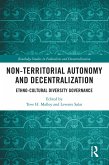Non-territorial autonomy is an unusual method of government based on the notion of the devolution of power to entities within the state which exercise jurisdiction over a population defined by personal features (such as opting for a particular ethnic nationality) rather than by geographical location (such as the region in which they live). Developed theoretically by Karl Renner in the early twentieth century as a mechanism for responding to demands for self-government from dispersed minorities within the Austro-Hungarian empire, it had earlier roots in the Ottoman empire, and later formed the basis for constitutional experiments in Estonia, in Belgium, and in states with sizeable but dispersed indigenous minorities. More recently, efforts have been made to apply it in indigenous communities. This approach to the management of ethnic conflict has attracted a small literature, but there is no comprehensive overview of its application. The intention of this special issue is to fill this gap, for the first time offering a comparative assessment of the significance of this political institutional device. Authors of case studies follow a common framework.
This book was published as a special issue of Ethnopolitics.
This book was published as a special issue of Ethnopolitics.
Dieser Download kann aus rechtlichen Gründen nur mit Rechnungsadresse in A, B, BG, CY, CZ, D, DK, EW, E, FIN, F, GR, HR, H, IRL, I, LT, L, LR, M, NL, PL, P, R, S, SLO, SK ausgeliefert werden.









